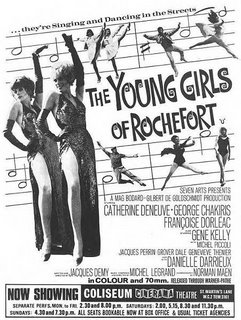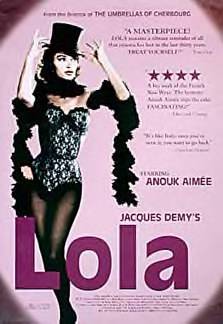Two Films by Jacques Demy
 After making the brief comment about my general feelings toward musicals, I'm now looking real sweet as, once again, I cheekily write about another of my favorite musicals, The Young Girls of Rochefort. The cheese-o-meter peeks in this 60s French musical as the charming predictability of the melodrama and intertwining narrative threads don't leave us wanting a more satisfactory payoff. The picture and color is beautiful as is most of the music (scored by Jacques Demy favorite, Michel Legrand).
After making the brief comment about my general feelings toward musicals, I'm now looking real sweet as, once again, I cheekily write about another of my favorite musicals, The Young Girls of Rochefort. The cheese-o-meter peeks in this 60s French musical as the charming predictability of the melodrama and intertwining narrative threads don't leave us wanting a more satisfactory payoff. The picture and color is beautiful as is most of the music (scored by Jacques Demy favorite, Michel Legrand). As politics go, this pacifist film layers its pointed relevance subtly, not unlike fellow Frenchman, Jacques Tati's brilliant Jour de fête. Dancing carnies replace military might in this lovely film about two talented ladies looking for their romantic ideal. Gene Kelly being dubbed into French is fun, but when he starts dancing, it makes everyone else look like someone stole their groove. The guy's got moves. The bit with the 'sadist' axe murderer is a complementing touch of macabre in an otherwise radiant musical.
As politics go, this pacifist film layers its pointed relevance subtly, not unlike fellow Frenchman, Jacques Tati's brilliant Jour de fête. Dancing carnies replace military might in this lovely film about two talented ladies looking for their romantic ideal. Gene Kelly being dubbed into French is fun, but when he starts dancing, it makes everyone else look like someone stole their groove. The guy's got moves. The bit with the 'sadist' axe murderer is a complementing touch of macabre in an otherwise radiant musical. Lola - Leave it up to Jacques Demy to bring melodramatic romanticism into the French New Wave. Lola, played by the dazzling Anouk Aimée, who you might remember from some of Fellini's films (La Dolce Vita, 8 1/2), follows the reflected/parallel lives of a cabaret dancer called 'Lola' (given name, Cecile) and a little girl, Cecile, who both fall in love with American sailors. In true Demy fashion, there is also a tangled set of circumstances that allow the downtrodden protagonist, Roland, to bump into Lola who he has been pining for since childhood. Given that the film is markedly nouvelle vague (minimal cast, natural lighting, hand-held or static photography) the frankness of the scene where Lola and Roland discuss their possible future is beautiful, even though we hate to see the poor guy get shot down.
Lola - Leave it up to Jacques Demy to bring melodramatic romanticism into the French New Wave. Lola, played by the dazzling Anouk Aimée, who you might remember from some of Fellini's films (La Dolce Vita, 8 1/2), follows the reflected/parallel lives of a cabaret dancer called 'Lola' (given name, Cecile) and a little girl, Cecile, who both fall in love with American sailors. In true Demy fashion, there is also a tangled set of circumstances that allow the downtrodden protagonist, Roland, to bump into Lola who he has been pining for since childhood. Given that the film is markedly nouvelle vague (minimal cast, natural lighting, hand-held or static photography) the frankness of the scene where Lola and Roland discuss their possible future is beautiful, even though we hate to see the poor guy get shot down. In Lola, Demy's penchant for making lovely and romantic films isn't lost in the new waviness either, but spins a harmony between the often dour realism of the period and a positive outlook on destiny and fate that approaches idealism. However, destiny is a two-edged blade, and to say that the film ends happily would be to say that only fools and grown-ups experience heartache - as is suggested when the younger Cecile runs off to become a hairdresser rather than a dancer. But what should we expect? We knew what it was when we picked it up.
In Lola, Demy's penchant for making lovely and romantic films isn't lost in the new waviness either, but spins a harmony between the often dour realism of the period and a positive outlook on destiny and fate that approaches idealism. However, destiny is a two-edged blade, and to say that the film ends happily would be to say that only fools and grown-ups experience heartache - as is suggested when the younger Cecile runs off to become a hairdresser rather than a dancer. But what should we expect? We knew what it was when we picked it up.'Se moi. Se Lola.'
Tagged under:
Film, Entertainment
Labels: Critical Studies, Film


0 Comments:
Post a Comment
<< Home